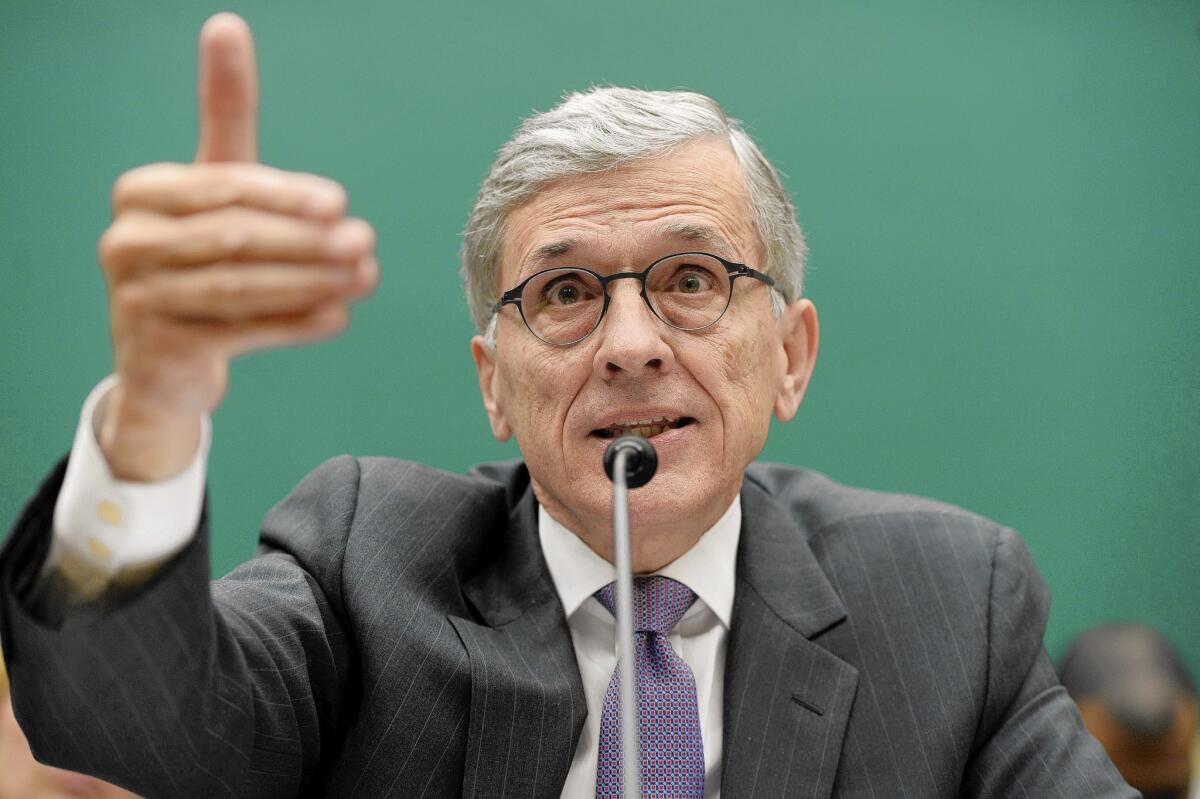FCC chief defends net plan

Democrats want strong protections on the Internet to make sure that network owners don’t discriminate against anyone online. Republicans don’t want any rules whatsoever that they think could stifle the online ecosystem.
So proposed net neutrality rules that take a bit of a middle course didn’t fare well at a House committee hearing Tuesday as Tom Wheeler, chairman of the Federal Communications Commission, faced heavy criticism from both sides for his plan.
“The Internet has flourished under the current light-touch regulatory scheme, and subjecting it to burdensome regulations is a leap in the wrong direction,” Rep. Fred Upton (R-Mich.), chairman of the House Energy and Commerce Committee, told Wheeler at the 21/2-hour hearing.
Rep. Henry Waxman (D-Beverly Hills) and other Democrats said Wheeler’s plan doesn’t go far enough in asserting stronger regulatory powers to prevent broadband providers from charging companies more for preferential delivery of their content.
“Paid prioritization divides the Internet into haves and have-nots, and it will entrench the big companies at the expense of start-ups,” he said.
And consumer groups complain it could end up costing users more as companies pass on the costs they have to pay for preferential treatment.
The hearing, the first for Wheeler since a federal court tossed out the FCC’s net neutrality rules in January, highlighted the controversy over his attempt to find a compromise.
“He’s getting it from both sides because they know this is raw political battle, and if you don’t speak up, you’re going to lose,” said David Kaut, a longtime Washington telecommunications analyst. “He’s politically and legally got to walk a very fine line.”
Wheeler said his plan attempts to reinstate net neutrality rules that can stand up to legal review.
“I understand that there is a great debate on this issue,” Wheeler said, a nod not only to the comments at the hearing but protests last week outside the FCC’s headquarters.
“I’ve consistently said that there is only one Internet,” Wheeler said. “There’s not a fast Internet and a slow Internet. ... And when the consumer buys access to the Internet, they are buying access to the full Internet, and that’s what our rules attempt to protect.”
With the backing of the agency’s other two Democrats, Wheeler was able to advance his network neutrality plan last week. The 3-2 vote along party lines started a four-month comment period on important questions about how to ensure that broadband providers don’t become gatekeepers of Internet content.
One key question is whether broadband providers should be subjected to tougher, utility-like regulation under the nation’s telecommunications law.
Republicans oppose any net neutrality rules, arguing that the Internet has flourished in large part because it has been free from heavy government regulation. They are particularly upset about the idea of reclassifying Internet providers as so-called common carriers, similar to phone companies.
Rep. Greg Walden (R-Ore.) said such a move would “give the bureaucrats at the FCC the authority to second-guess business decisions and to regulate every possible aspect of the Internet.”
Wheeler’s plan comes after a federal court in January tossed out the agency’s 2010 net neutrality rules.
Under his proposal, Internet service providers would be prohibited from blocking access to any legal content, prioritizing delivery of their own content and slowing the speed of a customer’s service. A watchdog position would be created to look for abuses.
But Wheeler’s plan could allow Internet service providers to charge companies and websites for preferential delivery of their content to consumers. The proposal seeks public comment on whether such paid priority should be banned.
Lawmakers tried to pin down Wheeler on whether he opposed allowing paid priority. He didn’t say so directly but suggested he did in some cases.
Some Democrats said it should be prohibited.
“If this concept moves forward, we could inadvertently block the next Google or Amazon from the market without even knowing it,” said Rep. Doris Matsui (D-Sacramento).
Republicans were sharper in their criticism of Wheeler.
“This policy would be an extreme exercise of government overreach and likely result in failed websites, downgraded and poor customer service, less choice and flexibility for consumers, businesses and stifling of innovation through regulation,” said Rep. Bob Latta (R-Ohio), who promised to introduce legislation to prevent “this misguided regulatory proposal.”
With most Democrats, including President Obama, in favor of net neutrality, Wheeler probably will push forward with tough rules, said Jeffrey Silva, an independent telecommunications analyst.
“I think Republican criticism, that’s just going to be something he has to deal with,” Silva said. “Democrats want a more vigorous net neutrality policy, and Republicans want a less hands-on approach. That dynamic’s not going to go away.”







